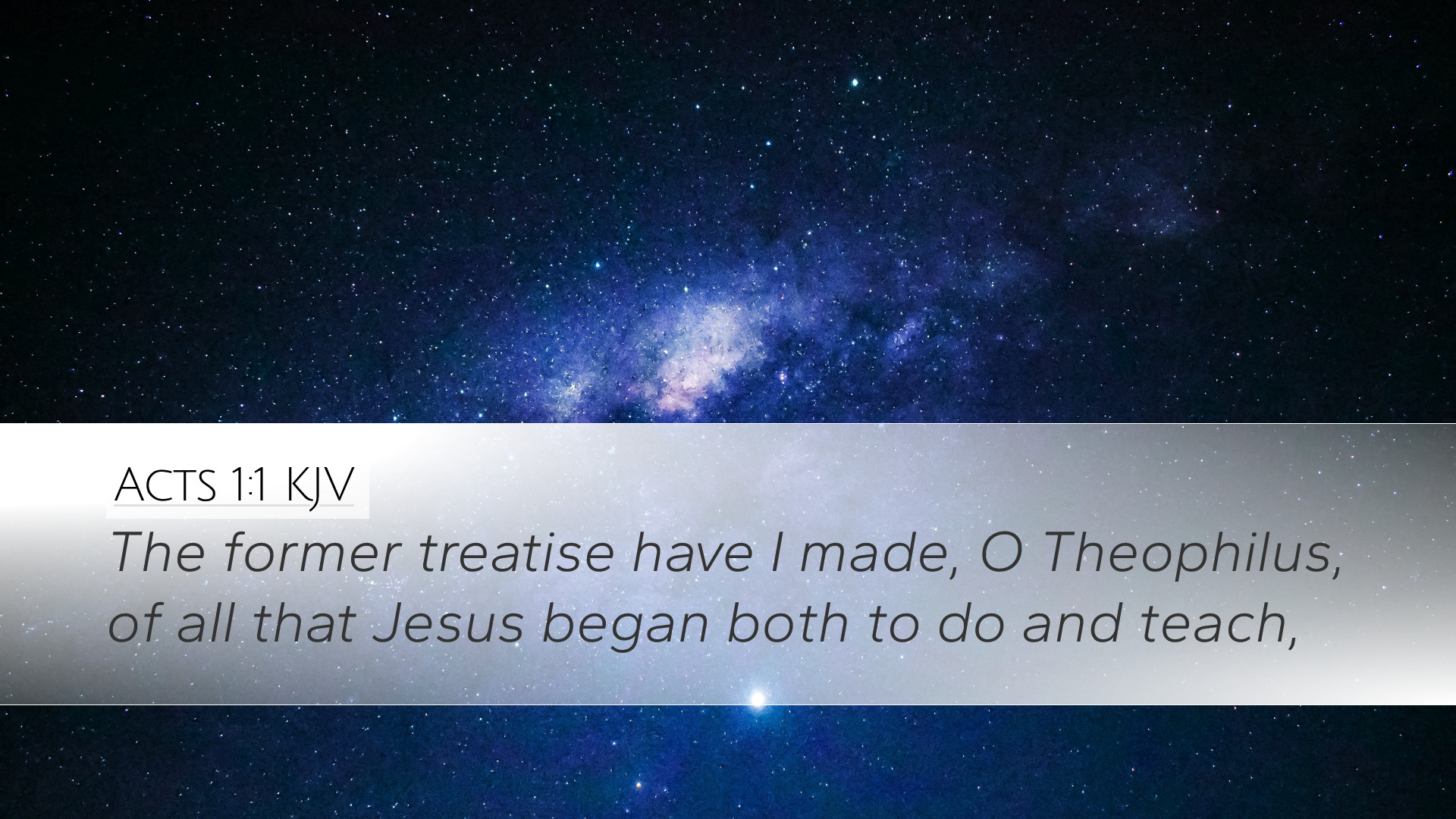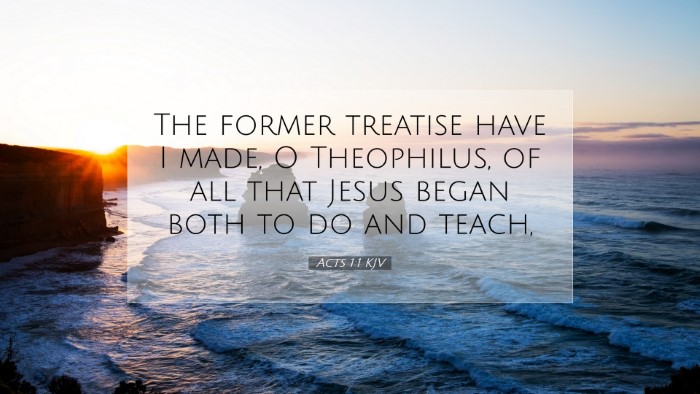Old Testament
Genesis Exodus Leviticus Numbers Deuteronomy Joshua Judges Ruth 1 Samuel 2 Samuel 1 Kings 2 Kings 1 Chronicles 2 Chronicles Ezra Nehemiah Esther Job Psalms Proverbs Ecclesiastes Song of Solomon Isaiah Jeremiah Lamentations Ezekiel Daniel Hosea Joel Amos Obadiah Jonah Micah Nahum Habakkuk Zephaniah Haggai Zechariah MalachiActs 1:1
Acts 1:1 KJV
The former treatise have I made, O Theophilus, of all that Jesus began both to do and teach,
Acts 1:1 Bible Commentary
Commentary on Acts 1:1
Acts 1:1 states, "The former treatise have I made, O Theophilus, of all that Jesus began both to do and teach." This verse serves as the introduction to the Book of Acts, and it provides essential insights into its purpose and context.
Context and Background
The Authorship of Acts: The Book of Acts is traditionally attributed to Luke, the physician and companion of Paul. The reference to "the former treatise" implies that this work follows the Gospel of Luke, which also addresses Theophilus.
Theophilus: The identity of Theophilus remains somewhat ambiguous. Some scholars suggest he was a real individual, possibly a Roman official or a patron of Luke. Others propose that the name, meaning "friend of God," represents a broader audience. This addresses both an individual and the larger community of believers.
Purpose of the Treatise
The purpose of Acts is multifaceted:
- Continuation of the Gospel Narrative: Acts serves as a bridge between the life of Jesus and the establishment of the early Church. It recounts the acts of the apostles and the work of the Holy Spirit.
- Historical Account: The narrative provides a historical account of the spread of Christianity from Jerusalem to the ends of the earth, emphasizing the fulfillment of the Great Commission.
- Theological Teaching: The Acts of the Apostles offers deep theological insights into the nature of the Church, the role of the Holy Spirit, and the mission of believers.
Insights from Public Domain Commentaries
Matthew Henry
Matthew Henry's commentary emphasizes the significance of the transition from Jesus’ earthly ministry to the apostles' mission. He notes that this "former treatise" is a testament to what Jesus began, highlighting that the continuation of Jesus' works is now entrusted to His disciples.
Henry points out the importance of the term "began," suggesting that while Jesus initiated the work, it was meant to carry on through the apostles, empowered by the Holy Spirit. This indicates a seamless connection between the Gospel and the Acts, showing that both are integral in understanding the fulfillment of God's plan through His Church.
Albert Barnes
Albert Barnes provides additional insights into the nature of "the former treatise." He elaborates that Luke's Gospel documents the teachings and actions of Jesus, focusing on His earthly ministry, while Acts extends this narrative into the age of the Church. Barnes highlights that the phrase "have I made" denotes a sense of purpose and careful compilation, reflecting Luke's intent to provide an orderly account of events.
Moreover, Barnes notes the importance of presenting the message to Theophilus, which might indicate a need for clarity and understanding regarding the Christian faith amidst the tumult of the early Church. This highlights the apologetic nature of Luke's writings, aiming to confirm the faith of early believers and seekers alike.
Adam Clarke
Adam Clarke's commentary delves into the theological implications of Jesus' teachings and actions. He emphasizes that the work of Christ is not only historical but also transformative. Clarke notes that the phrase "began both to do and teach" suggests that Jesus' teachings were accompanied by divine authority and demonstrated through miracles and acts of compassion.
Clarke also underscores the significance of the "doing" and "teaching" aspect, implying that the disciples are called to embody both aspects. The early Church was not merely to teach doctrine but to live out the faith in practical ways. This duality reflects the holistic approach of Christian discipleship.
The Call to Action
The opening verse of Acts sets the stage for a call to action. It charges pastors, students, theologians, and scholars with the responsibility to not only study the Scriptures but to embody the principles encapsulated within them. The early Church thrived through both learning and application, a model that remains relevant today.
Conclusion
Acts 1:1 challenges believers to reflect on the legacy of Jesus’ ministry and the ongoing mission of the Church. As noted by the commentators, the transition from Christ’s work to the apostles' ministry is profound. It emphasizes that the work of Christ continues through His followers, under the guidance of the Holy Spirit. For pastors and theologians, this passage encourages an understanding of the continuity of faith and action in the life of the Church.
The teachings of Jesus do not conclude with His ascension; rather, they challenge every generation to engage actively with the faith, reminding them that the mission is alive and continues through the empowered community of believers. This verse serves as an essential refrain for any who aspire to lead, study, or embody the teachings of Jesus Christ.


